“Three profoundly destabilizing ideas ricochet through the twentieth century, trisecting it into three unequal parts: the atom, the byte, the gene […] each represents the irreducible unit […] of a larger whole.” (Siddhartha Mukherjee, 2018, The Gene: An Intimate History)
We invite researchers and scientists to this two-day spring workshop in Berlin. Together, we seek to understand this destabilizing character of the conjunction between “the byte” and “the gene” – digitization and biology for health futures. We do this through the lenses of digital infrastructure, innovation, and digital entrepreneurship. The two-day workshop will be held at the Einstein Center Digital Future in Berlin (Germany).
Co-Conference Chairs:
Sirkka Jarvenpaa (University of Texas at Austin),
Michael Barrett (University of Cambridge),
and Hannes Rothe (Freie Universität Berlin)
Use and re-use of shared data triggers new value creation mechanisms. Data can be used and re-used to create opportunities and generate benefits in ways that could not be foreseen when the data were created (OECD 2016). The interest in the potential of data harnessing and sharing has been reflected in recent IS conferences, where track themes include “Big Data Analytics and Business Transformation” (ECIS 2017, ECIS 2018), “Digital Ecosystems” (ECIS 2017, ECIS 2018), “Business Analytics and Data Science” (ECIS 2017), “Data Science, Decision analytics and visualization” (ICIS 2017), “Data Science and predictive analytics” (ICIS 2018) and “Bridging the internet of people, data, and things” (overall In research about platforms, infrastructures, or services that collect, store, or analyze data, the information system stays in the spotlight – not the role data itself (Jarvenpaa & Markus, 2018). The facilitation of data storage, curation and access is crucial for data to serve for multiple and possibly unexpected purposes (Tempini, 2017; Vassilakopoulou, Skorve, & Aanestad, 2018). Even a conversation about boundary resources – an artifact that enables this serendipitous purpose – tends to focus on the implemented API instead of the data that is exchanged (e.g., de Reuver, Sørensen, & Basole, 2017; Eaton, Elaluf-Calderwood, Sorensen, & Yoo, 2015; Ghazawneh & Henfridsson, 2013).
We seek to improve our understanding about the role of data and data infrastructures as a driver of digital innovation (e.g., Barrett, Davidson, Prabhu, & Vargo, 2015; Fichman, Dos Santos, & Zheng, 2014; Yoo, Henfridsson, & Lyytinen, 2010)and digital entrepreneurship (e.g., Davidson & Vaast, 2010; Kelestyn & Henfridsson, 2014; Nambisan, 2016).
This two-day workshop focuses on bio data and data infrastructures, because of its under-representativeness in IS research while holding huge potentials for societal impact. Recent advances in biology promise new diagnostics, treatments, products, and services that change microbial, animal, plant, and ultimately human life (and death).
The collection, access, and analysis of bio data is getting cheaper and faster. Merely a few decades ago, sequencing of a single human genome took nearly 20 years and cost 3 billion dollars. Today, whole genome sequencing costs less than 1000$ and takes days instead of years. Thus, genome data infrastructures are growing exponentially (Birney, Vamathevan, & Goodhand, 2017). At the same time, predictive models developed from association studies require access to large-scale genomic databases. Technological advances in parallel or in-memory processing as well as machine learning hold the potential to largely reduce entry barriers to analyze this data by new ventures.
In effect, we not only see ventures in B2B that offer specialized diagnostics or patient-centered drugs, but also B2C companies with ancestry or health reports. Through the lenses of digital innovation and digital entrepreneurship, we might shed new light on how data and related infrastructures are created, processed, stored, and commercialized.

Professor Pentland received his PhD in Management from the Massachusetts Institute of Technology in 1991 and SB in Mechanical Engineering from the Massachusetts Institute of Technology in 1981. His publications have appeared in Academy of Management Review, Accounting, Organizations and Society, Administrative Science Quarterly, Management Science, Organization Science, YouTube and elsewhere. He is a recipient of the 2015-16 William J. Beal Outstanding Faculty Award.

Jessica is Head of EMBL-EBI Strategic Partnership Office responsible for strategy development, planning and industry initiatives within EMBL-EBI. This is a new Office that was created to drive broader academic and industry engagement demanded by the increased utility of genomics and biological data and the growing translational applications of bioinformatics. Jessica holds a PhD in Bioinformatics from University College London and has spent several years as Operations Director for Open Targets, a public-private partnership between GSK, Biogen, Takeda, EMBL-EBI and the Wellcome Sanger Institute.

Jason is a scientist entrepreneur passionate about translating innovative technologies into better patient outcomes. As CEO and co-founder of Start Codon, a Cambridge-based accelerator, he aims to identify and recruit the most disruptive healthcare start-ups worldwide, seed-fund them and leverage the exceptional resources of the Cambridge Cluster to de-risk and drive their success

Since October 2006, Dr. Bronsema has been CEO of the Biotechnologie-Industrie-Organisation Deutschland e.V. in Berlin. Prior to that, the biologist was in charge of communications at Roche Diagnostics GmbH and Diagnostics EMEA in Mannheim. Her previous positions include press and public relations at Lilly Pharma Holding GmbH and for the German Cancer Research Center (DKFZ) in Heidelberg. She began her career in 1989 as a research assistant at the Centre for Molecular Biology in Heidelberg.

Professor Høyer is interested in the organization and regulation of the healthcare system, in particular with respect to introduction of new medical technologies. His area of expertise is ethics as a form of regulation in relation to human bodily materials and health data. He has worked with, e.g., research biobanking, stem cells, property issues, forensic biobanking, public-private partnerships and public perceptions of genetics. Among hiscurrent projects you find an ERC-funded project on data intensification in healthcare: Policy, Practice and Patient Experience in the Age of Intensified Data Sourcing (POLICYAID).
Our primary objective is to bring together scholars with diverse expertise and disciplinary backgrounds and to establish an interdisciplinary community that could initiate novel conversations on this topic.
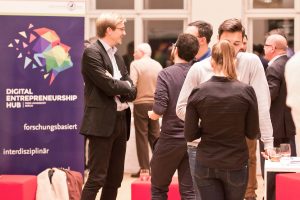
To this end, the workshop facilitates both small group and large group conversations topics. Specifically, the workshop schedule includes parallel small group sessions to which attendees will be assigned based on their abstract and field of interest. Key ‘takeaways’ from these small group sessions will be brought forth and discussed among all attendees in a few plenary sessions. Thus, the emphasis of the workshop will be on facilitating highly interactive discussions rather than formal topic presentations. In addition, we schedule keynote speakers on the two days. These keynote speakers will include senior industry executives, the head of a biotech accelerator, entrepreneurs, and academics. We expect to send you the final workshop program by February.
To cover the expenses for facilities, lunch and dinner on March 7 and March 8, 2019, we ask participants for a fee of 250 EUR (incl. VAT).
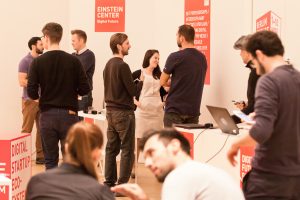
09:00 – 09:30 Introduction
09:30 – 11:00 Group discussion
11:15 – 12:15 Keynote by Brian Pentland (University of Michigan)
12:15 – 13:00 Lunch (Buffet)
13:00 – 14:30 Proposal Session 1 in round tables
14:45 – 16:15 Proposal Session 2 in round tables
16:15 – 17:00 Large group discussion
17:00 – 18:30 In the heart of Berlin – A walking tour
Dinner & Evening Event in the heart of Berlin

09:00 – 09:45 Keynote by Jason Mellad (Start Codon)
09:45 – 11:15 – Start-up challenges in the domain of health and bio data (with biotx and tycheheart)
11:30 – 13:00 – Industry challenges in the domain of health and bio data (with AstraZeneca)
13:00 – 14:00 – Lunch
14:00 – 14:45 – Keynote by Jessica Vamathevan (EMBL – European Bioinformatics Institute)
14:45 – 15:30 – Keynote by Viola Bronsema (Bio Deutschland)
15:30 – 16:15 – Keynote by Klaus Lindgard Høyer (University of Copenhagen)
16:15 – 17:00 – Reflection
Ali Sunyaev, Karlsruhe Institute of Technology, Germany
Brian Pentland, Michigan State University
Daniel Fürstenau, Freie Universität Berlin, Germany
Elizabeth Davidson, University of Hawai‘i at Mānoa, USA
Eivor Oborn, University of Warwick, United Kingdom
Georg von Krogh, ETH Zürich, Switzerland
Guodong Gao, University of Maryland, USA
Indranil Bardhan, University of Texas at Dallas, USA
Jan Marco Leimeister, University of St. Gallen, Switzerland
Kalle Lyytinen, Case Western Reserve University, USA
Katharina Lauer, Elixir, United Kingdom
Lars Matthiassen, Georgia State University, USA
Lynne Markus, Bentley University, USA
Magnus Mahring, Stockholm School of Economics, Sweden
Margunn Aanestad, University of Oslo, Norway
Martin Gersch, Freie Universität Berlin, Germany
Olga Makarova, Freie Universität Berlin, Germany
Panos Constantinides, University of Warwick, United Kingdom
Ravi Aron, John Hopkins University, USA
Ritu Agarwal, University of Maryland, USA
Samer Faraj, McGill University, Canada
Shi-Ying Lim, National University of Singapore, Singapore
Vaibhav Rajan, National University of Singapore, Singapore
Xenia Vassilakopoulou, University of Agder, Norway
Youngjin Yoo, Case Western Reserve University, USA
Registration closed
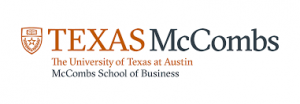
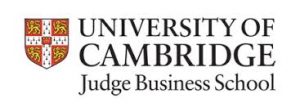




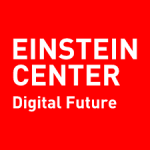
This post is also available in: Englisch

Eine Einrichtung der
